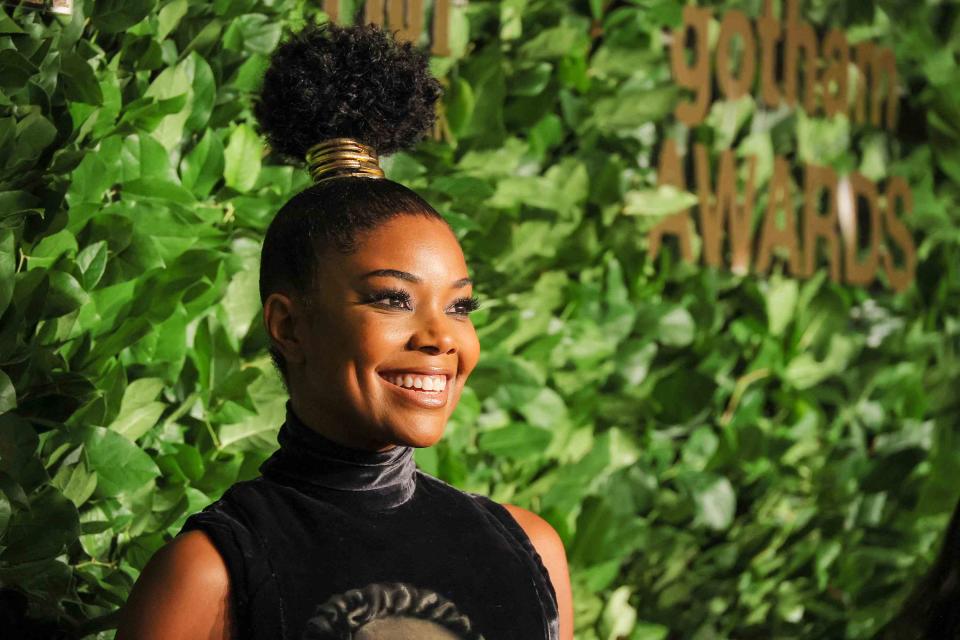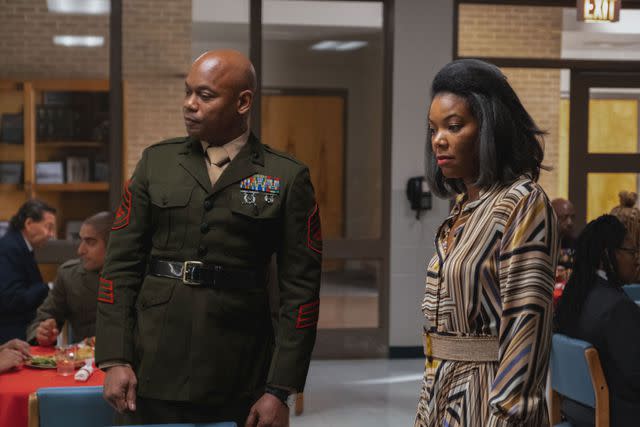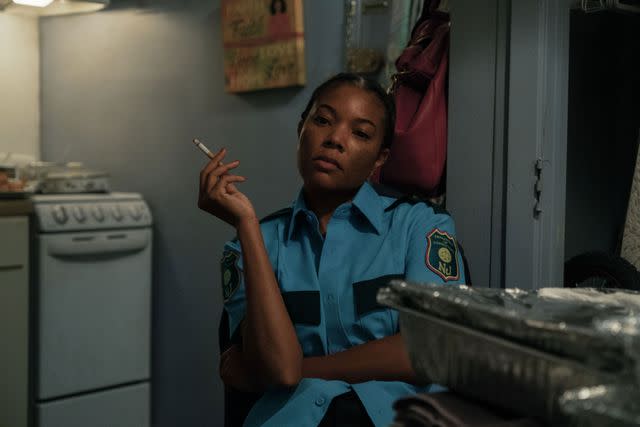Gabrielle Union Is Ready to Fight
- Oops!Something went wrong.Please try again later.
- Oops!Something went wrong.Please try again later.
With The Inspection, she’s going to war for her career and her family.

Getty Images
Gabrielle Union’s magnetic, buzzworthy performance in A24’s The Inspection doesn’t just mark a self-proclaimed transition from “entertainer” to “serious actor.” Instead, the actress’s portrayal of Inez — a toiling, single mother who kicks her son Ellis French (Jeremy Pope) out at the age of 16 for no other reason that his sexual orientation — reflects elements of a very real war Union continues to wage in her (especially public) day-to-day life. And as Union admits as we sit down to talk ahead of the film’s Dec. 2 release date, watching her widely praised performance felt like so much more than a turning point in her career. Rather, it made her feel even more ready “ready to fight” — both for her family, and for the roles she takes on next.
The film, which is semi-based on director Elegance Bratton’s life, follows a gay Marine Corps trainee as he navigates military life before the repeal of Don’t Ask, Don’t Tell and deals with the rejection of his mother, Inez. After watching The Inspection, it’s hard to imagine the character played by any other than Gabrielle Union. But, as the actress tells me, that’s almost exactly what happened. Although she was first set to join the project as a producer, it wasn’t long before Bratton offered her the role of Inez — and refused to take no for an answer.
“[Bratton said], ‘I would actually love for you to play my mother,’” Union shares. “I had to re-read it with that in mind and I was like, ‘Why would you want me to do this?’ And he was like, ‘It can only be you.’ And no one had ever said that to me ever in my whole career,” she adds. “He had such a wild confidence in me that I have never had in myself that I just believed him. It became contagious.”

Courtesy
:
With that newfound confidence in tow, Union began tackling the emotionally challenging role — a process that served as the catalyst for a whole lot of “healing that was happening at all times.” But while Union points out that the filming process was definitely difficult, she admits that watching those same scenes unfold on screen as a viewer, some of which mirrored conflicts that were happening in her own home, proved to be even more of a challenge.
“It's tough because [these scenes are a] reality in our household. It's not some Wicked Witch of the West. These are real people in our lives that we're dealing with that have a major impact on my loved ones,” Union says in reference to her stepdaughter Zaya Wade’s continued battle for ownership of her identity. “And so even something like a scene involving [French’s] birth certificate, when we shot it didn't necessarily resonate in the same way,” she continues. “I knew it was obviously important in the scene, but it's taken on a different significance as my own child fights to change her birth certificate to reflect her gender and her name and everything just feels different.”
Union admits that The Inspection has had an immeasurable impact on her career and mindset towards future projects (both as an actor and producer), but she’s mostly focused on the impression it will leave on its viewers.
“I'm watching it like ready to fight,” Union says when asked how attending The Inspection premiere made her feel. “I will fight so my child does not have the same fate, and so that my child doesn't lose hope. And hopefully, if I can get that in my own household, other households will find more hope and change before it gets to where we got to in the film. It's hard to watch, because it's real.”
InStyle spoke to Gabrielle Union about her therapy journey, what it was like wearing multiple hats on set, and why she’s seeking roles that “scare” her.
Inez’s parenting style could not be more different from your own. How did you deal with any feelings of guilt or sadness that came up during the filming process?
Well, therapy. My therapist was working overtime. I'm sure she bought a second home just from The Inspection. I needed to get out a lot of things, because where it got dark is trying to find a way in to the character, and I was committed to not judging this character. Generally speaking, I judge every character I've ever played, and then I act out that judgment on screen. But for her, I actually wanted to do my job and do it well and figure out a way in to craft a character versus just trying to mimic [director Elegance Bratton’s] mother.
I realized the thing we have in common is this need to be considered “good.” And the need to try to assimilate to a point where you've assimilated your way out of common sense and decency. And for Inez, she was willing to barter with her child because she, in her branch of organized religion that she subscribed to, being gay or queer made you “bad.” And if you raised a queer person, you're bad by extension. And she wanted no part of that and put her own child out at 15, 16 years old.
How did you relate that idea to your own life?
While I've never bartered with my children, I have absolutely bartered with my soul. You think of every time you've seen something, and you don't say something. Every time you knew better but kept your mouth shut because you don't want to mess with your access or your opportunities — or relationships I'll never mend because I chose respectability over decency.
That is where the guilt comes in — the connection I have with the character of how I was OK to move through the world as long as I had access. As long as you thought of me as one of the “good ones,” not like the others, I was willing to barter with everything. I joke, I bartered with my upper lip. There were years in high school where I would smile [without showing my upper lip] because I thought it was the thing that was giving away my Blackness, not my whole-ass body.
But you look at pictures from high school and my upper lip is missing, because I wanted to try to minimize my Afrocentric features to be closer to whatever ideal was in, which was never Black women. But just the constant shape shifting to be accepted. And for my character, she just felt her child was a bridge too far and that she had to put him out to be a good mother. The harm caused and the trauma caused in her mind was worth it to be considered worthy and deserving and good.
What was it like unveiling these realizations through therapy while simultaneously portraying heavy, real-world scenarios during the filming process?
You realize the fissures that you’ve caused, all the things you just went along with, all the times you buried your head in the sand, all the times you turned a blind eye. Those people didn't just evaporate. Those situations didn't just dissolve or heal themselves. Real people were impacted and all I cared about was, “Do you think I'm good? Do you think I am?” You don't get that back. You have to live with it. You have to wake up knowing that you were part of the problem. They say be the change you want to see, but what happens if you weren't?
What happens when it was time for you to be an ally and you turn the other cheek? What happens when it was time for you to be the cavalry that showed up for other people and you opted for proximity to power structures? Even if you figure it out later, you have to sit with that, and it's ugly, dark reality.
How will this experience impact your career?
If I'm going to call myself an ally, if I'm going to call myself an actor-activist, I got to walk the walk and talk the talk. And it doesn't mean I'm a freaking narc at all times, but also don't think you're going to say some stuff around me that I'm not going to check you on. And I'm going to check you quick. Might check with a chuckle or a smirk, but it's not going down on my watch, it's just not. I need to be a more active participant in being a part of the solution.

Courtesy
:
In what ways has this film already impacted audiences?
This kind of project is really moving mountains, and people are like, “Well, it's not curing cancer.” But for a lot of families, people who've taken their parents to see this movie already, I’ve heard from parents, “I did not want to see myself in your character, and I did. And I will fix this. I have to fix this.”
A lot of parents feel like they are being loving and think that rejecting or abusing or harming their child is a loving gesture. They are “saving their souls” or what have you. Those parents’ intentions, no matter how we all look at it, is to make themselves feel pure and good.
So, just trying to show people that you do not have to go down this route. Your children are never disposable and loving your children should never equate to their harm. And if you think that loving your children means denying their identity — which when you deny someone's identity, you deny their humanity — your love should not be inhumane. And there's, what? There's 8 billion people now, right? There's 8 billion ways to love one another. Pick one that does not equate to abuse or harm or neglect.
Working both in front of and behind the camera on The Inspection, how was the filming experience different from projects you’ve done in the past?
Not as different, because I tend to do projects that have smaller budgets, very little time. So, my commitment to efficiency and just making sure that we got the shots we needed, stayed on task, and paid attention to the sun. All of that stuff. Throughout the day, I'm whipping off a hat here, adding a hat here, whipping off a hat here, adding a hat there.
I’m doing this in between other projects, so I didn't have extra days. We have to get it. There are no additional days, we have to figure this out. So, it was a challenge. And also holding space not only as a producer and as an actor, but as a mom to allow for a lot of grief and healing that was happening at all times for a lot of people. Allowing for that and not being such a hardass that there's no room for emotion, real human emotion dealing with very tough subject matter that is personal.
You’ve said before that this was the project that marked your transition from “entertainer” to “actor.” What was it like battling that change in thought process?
Elegance was so confident in what I was doing. From the first scene on set to my last, his confidence in what I brought never wavered. So, it gave me the freedom to explore even deeper parts of myself that I just never, I don't know, I guess I just never felt the luxury of being able to. He had so much confidence in me that I got to do everything I wanted to do. I felt confident: When he would yell, "cut," I'm like, “I got it.”
Working with Bokeem [Woodbine] — we worked together on City of Angels 20-plus years ago — he's like, “Gab, you've had it. Are you insane?” But Hollywood tells you something else and you believe it about yourself. That you only do certain things and you're not an actor, you're an entertainer and you put butts in the seats and you get ratings. But can you act? Leave the acting to the others. And so you just ... leave it to the others.
How will this impact the projects you pursue going forward?
With this, I felt so empowered and so lifted up. [Elegance] exalted me. I just have not ever felt that everyone had a confidence in me to deliver, and I delivered. And now, I want different for my career. I want to at least give myself the opportunity to try to fail. You know what I mean? Can I audition and suck? Just give me a shot at failure. I don't have to succeed. But I am open to the process. And I don't think I've had an audition in, I don't know, 20 years? But imagine if they're only offering you the things that they think you can do and that you've decided they're correct about. There's so much that I just didn't even try. I just was like, “Oh, that's not for me.”
What’s your next dream role?
The dream is whatever scares me. Sanaa Lathan is one of my close friends. She gets offered everything under the sun. But she's like, "It doesn't scare me.” And I was like, "Why would you want something to scare you"? And she's like, "Baby, if it doesn't scare me, it's not worth doing.”
I was like, “No lies told there.” And it's been great. I mean, I've had a long career. My bills are paid, my family is taken care of. All the households that I am financially responsible for are sound. But creatively, I realized that there were things missing that I wasn't fulfilling. And now, I'm looking to fulfill every part of me when I'm looking at scripts.
For more InStyle news, make sure to sign up for our newsletter!
Read the original article on InStyle.

